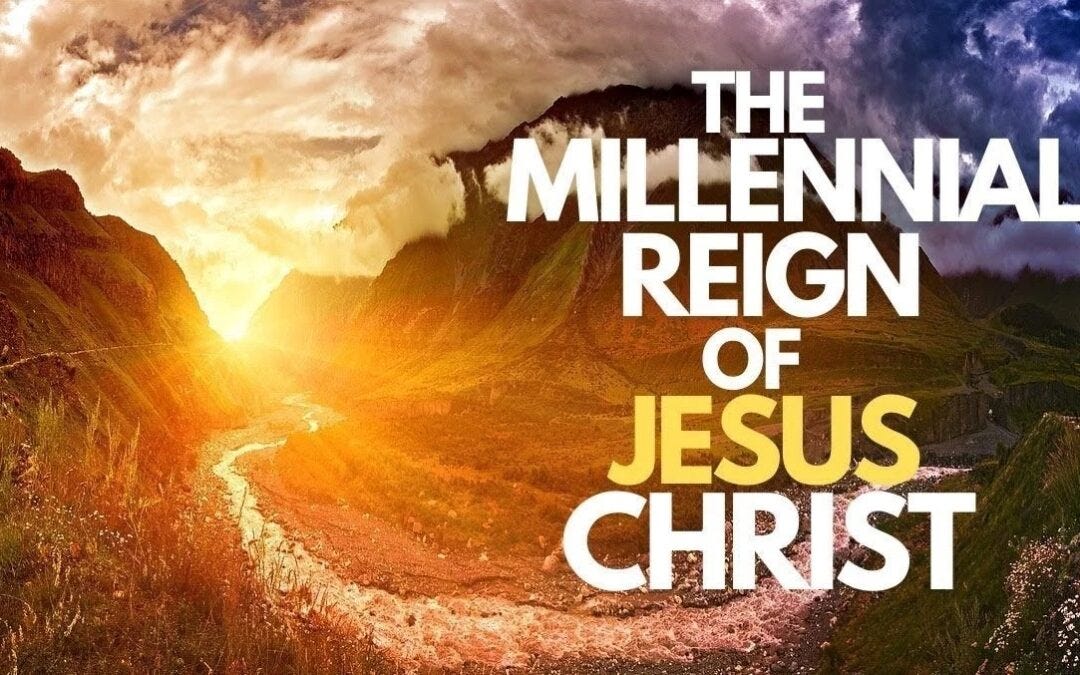A Millennial Kingdom?
Is the Kingdom Yet to Come?
Many people believe that Jesus Christ will return to earth to establish an earthly kingdom and reign for a thousand years. This idea, rooted in premillennialism, suggests that Christ will sit on David’s throne in Jerusalem and rule the world in a literal and physical sense. However, a thorough examination of Scripture reveals that Christ's kingdom is not of this world and that He is already reigning in a spiritual kingdom from heaven.
The Roots of Premillennialism
Premillennialism is a theological viewpoint that interprets Revelation 20:1-6 as a future event, where Christ will physically return to earth before a literal thousand-year reign. This perspective anticipates a future, earthly kingdom where Christ rules from Jerusalem, fulfilling Old Testament prophecies about David’s throne. However, to understand the true nature of Christ's kingdom, we must delve deeper into the Scriptures.
Prophecies of Christ's Kingdom
The Old Testament prophets spoke of the coming of Christ’s kingdom, but their prophecies pointed to a spiritual reign rather than an earthly one.
Isaiah and Micah both envisioned a time when the Lord’s word would go forth from Jerusalem in the latter days (Isaiah 2:2-3; Micah 4:1-2).
Daniel prophesied that this kingdom would be established during the days of the Roman kings (Daniel 2:44). Furthermore, Daniel described the ascension of Christ to receive dominion and glory (Daniel 7:13-14)
Joel foretold the outpouring of the Holy Spirit, an event fulfilled in Acts 2 during Pentecost (Joel 2:28-32).
The Announcement and Establishment of the Kingdom
John the Baptist and Jesus announced the kingdom as "at hand" (Matthew 3:1-2; 4:17). Jesus assured His disciples that some of them would not taste death before seeing the kingdom come with power (Mark 9:1).
After His resurrection, Jesus instructed His apostles to wait for the Holy Spirit, who would empower them to preach repentance and remission of sins starting in Jerusalem (Luke 24:46-49; Acts 1:4-8). This pivotal moment occurred in Acts 2, marking the birth of the church and the beginning of Christ’s kingdom.
Furthermore Jesus tells Peter in Matthew 16:18-19 -
“18 And I also say to you that you are Peter, and on this rock I will build My church, and the gates of Hades shall not prevail against it. 19 And I will give you the keys of the kingdom of heaven, and whatever you bind on earth will be bound in heaven, and whatever you loose on earth will be loosed in heaven.”
The Church and the Kingdom are used interchangeably showing that the Kingdom was not something that would be established in the future, but that it was present and at hand.
The Present Reign of Christ
Scripture consistently teaches that Christ is currently reigning in His kingdom.
In Colossians, Paul states that believers have been delivered from the power of darkness and conveyed into the kingdom of the Son (Colossians 1:13-14).
The author of Hebrews declares that Christ, having purged our sins, sat down at the right hand of the Majesty on high (Hebrews 1:3).
Revelation also depicts believers as part of Christ’s kingdom (Revelation 1:6, 9).
Paul explains in 1 Corinthians that Christ will reign until He has put all enemies under His feet, the last enemy being death (1 Corinthians 15:23-26).
Nature of Christ's Kingdom
Christ’s kingdom is not an earthly realm but a spiritual and heavenly one. When the Pharisees asked Jesus about the coming of the kingdom, He responded that the kingdom of God is within or among them (Luke 17:20-21). Before Pilate, Jesus stated that His kingdom is not of this world, but a kingdom of truth (John 18:36-37). Hebrews describes the heavenly Jerusalem and the unshakeable kingdom of Christ (Hebrews 12:22-24, 28-29).
Misinterpretation of Revelation 20
The notion of a literal thousand-year earthly reign stems from a misreading of Revelation 20, which is written in apocalyptic language. Revelation uses symbolic numbers and imagery to convey spiritual truths rather than literal events. For instance, Revelation 20:1-3 describes Satan’s binding, symbolizing the restriction of his power to deceive the nations during the church age. Revelation 20:4-6 portrays the victory of martyred saints who reign with Christ in heaven, not on earth.
Further Evidence
Christ's Throne and the Curse of Jeconiah
Christ is indeed the heir to David’s throne, but His throne is in heaven, not on earth.
Jeremiah prophesied that no descendant of Jeconiah would sit on David’s throne in Judah (Jeremiah 22:28-30). The Psalms and Acts affirm that Christ sits on David’s throne in heaven (Psalm 89:35-37; Acts 2:29-36). The book of Hebrews declares that Christ, being a priest from the order of Melchizedek, ministers in the heavenly sanctuary, not on earth (Hebrews 8:1-4).
How Could There Be an Earthly Kingdom with No Earth?
Moreover, Peter provides a crucial insight into the nature of the end times.
In 2 Peter 3:10, he writes, "But the day of the Lord will come as a thief in the night, in which the heavens will pass away with a great noise, and the elements will melt with fervent heat; both the earth and the works that are in it will be burned up."
This passage makes it clear that the physical earth will not remain for Christ to establish an earthly kingdom, as it will be completely transformed.
There Will Not Be a 1,000-Year Earthly Kingdom
The belief in a future thousand-year earthly reign of Christ is not supported by Scripture. The Bible clearly teaches that Christ’s kingdom was established with the Church, it is spiritual in nature, and that He currently reigns from heaven. At His second coming, Christ will not set up an earthly kingdom but will bring final judgment and consummate His eternal reign, turning the kingdom over to God the Father (1 Corinthians 15:24-26). Thus, believers are not to look for an earthly kingdom but to live faithfully under the current reign of Christ, anticipating His return and spending eternity reigning with Him.



